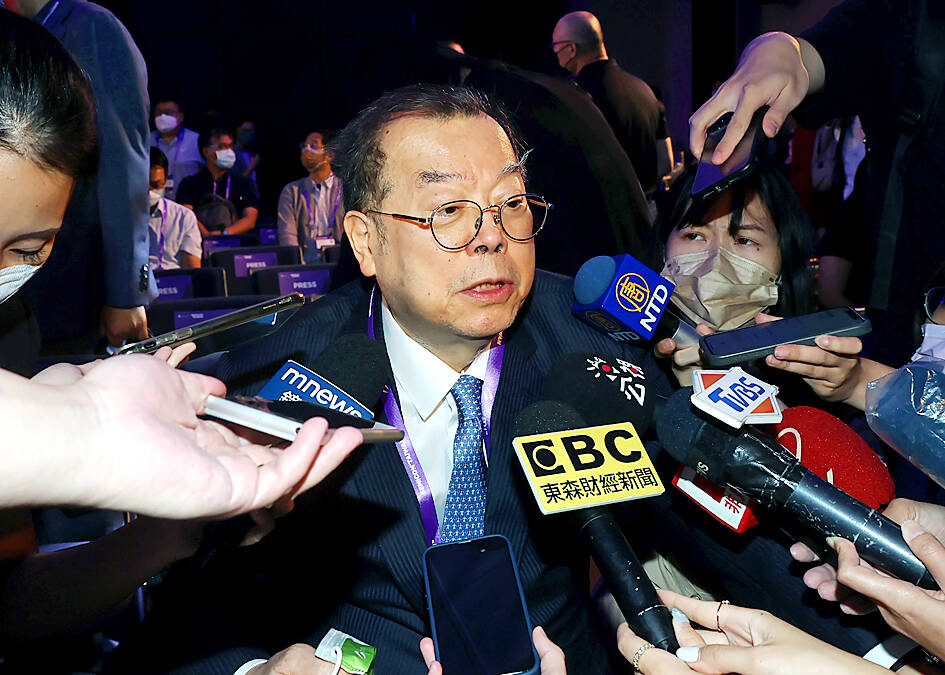As Taiwan plays a key role in global supply chains, local semiconductor companies should be cautious in responding to US plans to further curb exports of advanced chips to China, Powerchip Semiconductor Manufacturing Corp (力積電) chairman Frank Huang (黃崇仁) said yesterday.
Huang’s comments came in the wake of media reports that US President Joe Biden’s administration is considering broadening its ban on US exports of artificial intelligence chips and semiconductor equipment to China, aiming to obstruct Beijing’s progress in enhancing its chip development and manufacturing capabilities.
“The whole world needs chip supply from Taiwan. The supply chain cannot be disrupted abruptly,” Huang said. “Besides, Taiwan maintains a complementary relationship with China.”

Photo: CNA
Taiwanese manufacturers such as Quanta Computer Inc (廣達電腦) and Wistron Corp (緯創) assemble computers in China, but the chips they use are from Taiwan, he said.
Likewise, Apple Inc purchases Taiwan-made chips to manufacture iPhones in China, he added.
The US restrictions would have a mixed impact on Taiwanese companies, Huang said.
Taiwanese firms would obey US rules and its curbs on shipping advanced chips and sensitive technologies to China, but they would need a grace period of a year to seek alternative solutions, he said.
Under such a complex geopolitical environment, Taiwanese companies should carefully evaluate the pros and cons before making a decision and find solutions to prevent supply chain disruptions, he said.
Commenting on the latest inventory-driven semiconductor slowdown, Huang said investors have “overly reacted” to the ups and downs of the industry.
Semiconductor demand has come down from a peak driven by strong demand for PCs to cope with new work and lifestyles due to the COVID-19 pandemic in the past two to three years, he said.
Powerchip shares have tumbled amid a spate of corporate warnings about slowing demand for chips. The stock yesterday ended down 1.25 percent at NT$31.60 in Taipei trading.
The company, which makes power management ICs, dismissed the rumors, saying that most customers were adjusting their inventories.
Powerchip’s revenue surged about 40 percent to NT$55.71 billion (US$1.79 billion) in the first eight months of the year, compared with NT$39.82 billion in the same period last year.
The semiconductor industry would experience a mild recovery after supply chain inventory drops to a reasonable level through December and a brief dip caused by surging inflation, Huang said, adding that he was confident about the local semiconductor industry’s long-term prospects.
The production value of the local semiconductor industry surpassed NT$4 trillion for the first time last year, rising 26.7 percent from a year earlier to NT$4.1 trillion, Vice Premier Shen Jong-chin (沈榮津) said yesterday at the opening ceremony of the Semicon Taiwan trade show at the Taipei Nangang Exhibition Center’s Hall 1.
Taiwan has played a critical role in the global semiconductor industry on the back of a well-built industry cluster and its lead in advanced processes, Shen said.

The US dollar was trading at NT$29.7 at 10am today on the Taipei Foreign Exchange, as the New Taiwan dollar gained NT$1.364 from the previous close last week. The NT dollar continued to rise today, after surging 3.07 percent on Friday. After opening at NT$30.91, the NT dollar gained more than NT$1 in just 15 minutes, briefly passing the NT$30 mark. Before the US Department of the Treasury's semi-annual currency report came out, expectations that the NT dollar would keep rising were already building. The NT dollar on Friday closed at NT$31.064, up by NT$0.953 — a 3.07 percent single-day gain. Today,

‘SHORT TERM’: The local currency would likely remain strong in the near term, driven by anticipated US trade pressure, capital inflows and expectations of a US Fed rate cut The US dollar is expected to fall below NT$30 in the near term, as traders anticipate increased pressure from Washington for Taiwan to allow the New Taiwan dollar to appreciate, Cathay United Bank (國泰世華銀行) chief economist Lin Chi-chao (林啟超) said. Following a sharp drop in the greenback against the NT dollar on Friday, Lin told the Central News Agency that the local currency is likely to remain strong in the short term, driven in part by market psychology surrounding anticipated US policy pressure. On Friday, the US dollar fell NT$0.953, or 3.07 percent, closing at NT$31.064 — its lowest level since Jan.

The New Taiwan dollar and Taiwanese stocks surged on signs that trade tensions between the world’s top two economies might start easing and as US tech earnings boosted the outlook of the nation’s semiconductor exports. The NT dollar strengthened as much as 3.8 percent versus the US dollar to 30.815, the biggest intraday gain since January 2011, closing at NT$31.064. The benchmark TAIEX jumped 2.73 percent to outperform the region’s equity gauges. Outlook for global trade improved after China said it is assessing possible trade talks with the US, providing a boost for the nation’s currency and shares. As the NT dollar

The Financial Supervisory Commission (FSC) yesterday met with some of the nation’s largest insurance companies as a skyrocketing New Taiwan dollar piles pressure on their hundreds of billions of dollars in US bond investments. The commission has asked some life insurance firms, among the biggest Asian holders of US debt, to discuss how the rapidly strengthening NT dollar has impacted their operations, people familiar with the matter said. The meeting took place as the NT dollar jumped as much as 5 percent yesterday, its biggest intraday gain in more than three decades. The local currency surged as exporters rushed to